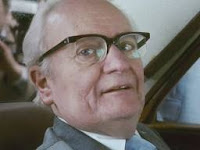Sundays feature a movie review. The column's title is a play on the title of Jules Dassin's 1960 film, Never on Sunday.I first laid eyes on Christopher Hitchens's 2010 memoir, Hitch-22, in the Yankee Bookshop in Woodstock, Vermont, which beautiful town I remembered fondly in yesterday's post. I read the memoir last year, and one of the many passages that fascinated me was Hitchens's account of meeting Margaret Thatcher. It must have been in 1974 (when Hitchens was 25 years old), soon after she became the leader of the Conservative opposition:
"Care to meet the new Leader?" [Hitchens was asked]. Who could refuse? Within moments, Margaret Thatcher and I were face to face.In The Iron Lady, Meryl Streep doesn't portray Margaret Thatcher as being particularly sexy, let alone "rather sexy." But she nails Thatcher's "slaughtering and cowing" the men at one of her last cabinet meetings, including Sir Geoffrey Howe (played by Anthony Head). (Sadly, I have seen other positionally powerful women behave similarly, at IBM thirty years ago and recently in university administration.)
...Almost as soon as we shook hands on immediate introduction, I felt that she knew my name and had perhaps connected it to the socialist weekly [in which I] had recently called her rather sexy. While she struggled adorably with this moment of pretty confusion, I felt obliged to seek controversy and picked a fight with her on a detail of Rhodesia/Zimbabwe policy. She took me up on it. I was (as it chances) right on the small point of fact, and she was wrong. But she maintained her wrongness with such adamantine strength that I eventually conceded the point and even bowed slightly to emphasize my acknowledgment. "No," she said. "Bow lower!" Smiling agreeably, I bent forward a bit farther. "No, no," she trilled. "Much lower!" By this time, a little group of interested bystanders was gathering. I again bent forward, this time much more self-consciously. Stepping around behind me, she unmasked her batteries and smote me on the rear with the parliamentary order-paper that she had been rolling into a cylinder behind her back. I regained the vertical with some awkwardness. As she walked away, she looked back over her shoulder and gave an almost imperceptibly slight roll of the hip while mouthing the words: "Naughty boy!"
I had and have eyewitnesses to this. At the time, though, I hardly believed it myself. It is only from a later perspective, looking back on the manner in which she slaughtered and cowed all the former male leadership of her party and replaced them with pliant tools, that I appreciate the premonitory glimpse—of what someone in another context called "the smack of firm government"—that I had been afforded. Even at the time, as I left that party, I knew I had met someone rather impressive. And the worst of "Thatcherism," as I was beginning by degrees to discover, was the rodent slowly stirring in my viscera: the uneasy but unbanishable feeling that on some essential matters she might be right. [pp. 205-206]
Some major events of Thatcher's parliamentary career:The Iron Lady (2011: Phyllida Lloyd) [An elderly Margaret Thatcher (Meryl Streep and Alexandra Roach) talks to the imagined presence of her recently deceased husband (Denis Thatcher,1915-2003, played by Jim Broadbent and Harry Lloyd) as she struggles to come to terms with his death while scenes from her past life, from girlhood to British prime minister, intervene] [E] 8-3-2012
Young Margaret and Denis
Thatcher arrives in Parliament in 1959, MP from Finchley, in north London.
In 1970 she is given the important job of Education Secretary, responsible for Britain's schools and colleges.
After the Conservatives lose in 1974, she becomes the leader of the opposition.
In 1979, Airey Neave (played by Nicholas Farrell), Conservative MP from Abingdon who had kindly welcomed Thatcher to Parliament in 1959, is assassinated in a car-bomb attack by the Irish National Liberation Army.
The Conservatives are re-elected later that year, and Thatcher becomes Prime Minister.
In 1982, Argentina claims the Falkland Islands, and Thatcher wins them back by lauching a military attack.
In 1984, the Irish Republican Army (IRA) attempts to murder Thatcher (and does murder some of her colleagues) by bombing their hotel in Brighton during the Conservative Party annual conference.
In 1990, one of Thatcher's longest-serving colleagues, Sir Geoffrey Howe, resigns and in a bitter resignation speech encourages a challenge to her leadership. Thatcher resigns.
 |
| Jim Broadbent |
My opinion may not be the majority one, however. After watching the trailer four or five times, with its scenes of Thatcher in her prime, I was at first confused by the fairly long opening of the aged Thatcher, whose portrayal by Streep is even more amazing, if not nearly so entertaining as the scenes reflected in the trailer.
I believe that A.O. Scott's New York Times review ("Polarizing Leader Fades into the Twilight," December 29, 2011) isn't the only one that expresses displeasure with the love-story focus. Scott complains about "the film’s vague and cursory treatment of her political career." I ask you, though, how could a 105-minute film fairly treat it? We'd need a five- or ten-episode Masterpiece Theater approach for that, I think.
I commend Morgan and Lloyd for choosing to do something they could do in a feature film—and for doing it rather well.


No comments:
Post a Comment